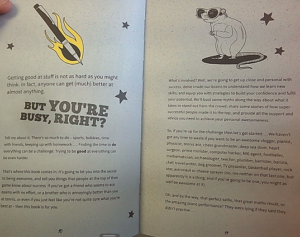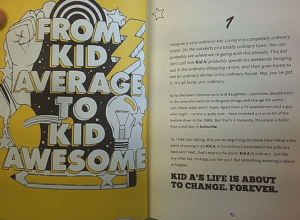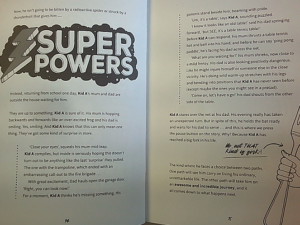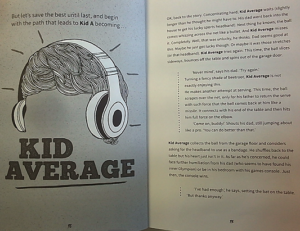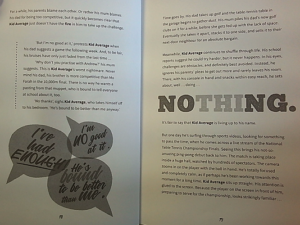Hello everybody! Mr P and Mr L have had a good week and enjoyed the sunny evenings going for the odd bike ride and the odd run respectively. They have both been enjoying the Geography work and watching the films based around Rio and learning about the two halves that comprise it.
This is our English home learning for the week ahead. For Guided Reading this week, we are thinking about transition and our mindset when dealing with ‘things’ and tasks that perhaps you have faced within your life. Our writing continues to focus on Mount Everest and Jordan Romero and you will have a writing outcome to complete for it!
Guided Reading
Book: You’re Awesome, by Matthew Syed
Monday
| Adjusting to Change and Managing Change (Our Transition to year 7)
How to maintain our feelings of ‘Feeling In Control’ in our current learning & What this looks like in our life-learning
|
Task
Read page 10 – 15.
Discuss and answer these questions:
1.What options does Kid A face at the end of page 15?
2.How many options does he have?
3.What will he need to do in order to be able to go on this ‘awesome and incredible journey?’
4.What will Kid A need to do if he is to carry on his path of ‘living his ordinary, unremarkable life?’
5.Kid A had table tennis as the situation that presented two options to him.
Have you ever been faced with two options like Kid A had? What was the situation in your life where you were faced with the two options?
6.What did you do when faced with the two options? Which option did you choose?
7.Why did you choose this option?
Tuesday & Wednesday
Discussions and reflections
Read page 16 – 19. Answer these questions:
1) Look at page 17. How could you sum up how Kid A is feeling at this point? How can you tell?
2) Look at page 17. What things happen that make Kid A just not enjoy the table tennis? List all your observations.
3) Is there anyone in particular at fault for why Kid A is not enjoying the table tennis? If so, what makes you think this?
4) Look at page 19. Kid Average views, ‘challenges as obstacles, and definitely best avoided.’
How would you sum up this view that Kid Average has about challenges? How does Kid A view challenges in his life?
5) Have you ever felt like this when you have been faced with certain, specific challenges? What were the challenges that made you feel this way?
6) How did you respond to the challenge that you identify in Q5?
7) How could you have faced the challenge from Q5 in a better, more productive way?
8) What do you think will be your biggest challenge when you move to secondary school in September?
9) Create a set of steps to success that will make your biggest challenge in September more achievable.
10) How are you and Kid A similar? Give examples to hang your ideas on.
11) How are you and Kid A different? Give examples to elaborate on your thoughts.
12) Do you feel sorry for Kid A at all? Why?
13) Does the father’s attitudes and mannerisms change during both table tennis matches?
14) How does the Kid change in his attitudes, mannerisms and outlook between both table tennis matches?
Thursday
Questions – Further thinking and personal reflection
1.Read page 20. How is ‘Kid A Awesome’ different from ‘Kid A Average?’ Sum this up using a phrase from page 20.
2.Kid Awesome doesn’t give up with his table tennis.
Using the continuum line below, mark on the line where you think you are when it comes to ‘not giving up’ with tasks and things in your life.
Tasks and Things in your own life
_____________________________________________________________________
I always give up I never give up
3.Why did you make your mark where you did? List the things you DO or DON’T give up on, to prove your opinion of yourself.
4.How does this make you feel inside? Why?
5.How do you think you could ‘Never give up’ a little more often with things and tasks in your life? Use examples to show HOW you could ‘never give up’ on things and tasks.
6.Would never giving up a little more often be a simple way to live or a hard way to live? Why?
7.‘Anything that is worth having in life takes time and hard work.’ (St Peter’s Year 6 team)
What is this quote getting at? What does it mean? Explain, and use examples from in school or out of school to reveal your thinking.
8.What could you keep devoting time and hard work to, so that you improve gradually over time? List one thing for in school and one thing for out of school.
Friday
Read for enjoyment for 30 minutes.
Writing
Monday – Proofread, edit and improve your short writing piece from Friday. Make sure you check simple spellings and check any silly errors you may have made.
THINK – did you include most or all of the tools and nouns that were mentioned in the brief on Friday? Did you marinade for long enough in the tension of just before the avalanche hit? And, did you immerse in the tension of when it actually did make contact with Jordan and father? Did you write about the bottomless cliff that was situated close by?
Tuesday – Look at the question below.
“Should Jordan’s father have allowed him to climb Mount Everest, given his age?”
You then have to decide ‘Yes’ or ‘No’ to the question OR you can have a balanced viewpoint and therefore make notes about both sides of the question. Personally, I would choose this as I then will have more to write about and I personally can ‘see’ both sides of the argument with this question.
Then, within your notes, justify your reasons ‘why’ in the form of notes, at the moment. I would create a table and I would re-watch the film from last week to refresh my mind and viewpoint. On top of this, I would make notes of the statistics that are mentioned in the film footage and use this as reasons and evidence for your viewpoint.
So, today you are making notes and fleshing these thoughts out.
Remember an introductory paragraph and a closing paragraph and make notes for both of these too. THINK – what would you write about in these? How many people have died? How many have survived? The idea of pushing the human limits and of seeing how far a human can go? The idea of Human Exploration and Evolution? How you cannot control the weather on Everest and the impact of this? How humans should respect the environment and not tamper with ‘Mother Nature?’
Wednesday, Thursday and Friday
Write your developed piece in response to the question above. Take your time…
Remember, you can write a balanced argument if you feel confident when thinking and seeing both points of view during the week. You can then give your own opinion in the closing paragraph about what you ‘truly’ feel if you have chosen a balanced argument form of writing. If you choose to write a balanced argument, remember to use paragraphs to section your thinking.
Think about what subordinating conjunctions you will use to open sentences and paragraphs to either build on a point or when making a new point, eg. On top of this… Furthermore…However…Having said this…Moreover…In stark contrast, it could be argued that…
Spellings, Vocabulary and Grammar
Subordinating conjunctions practise (15 minutes, three times)
Look; cover; write and check these. Think about HOW you could use them in your writing outcome for this week too…
Although… Provided that… Supposing… Rather than… In order to…
Even though… Having said this, Therefore, Furthermore,
On top of this, Moreover, In reality,
Challenge
Look at the spellings words and phrases above.
Which ones are ‘to build upon a point’ and which ones would be used to ‘start a sentence to show the opposite viewpoint of the previous sentence’? Make a table and list the words/phrases under the correct heading. Include the commas that go with the words or phrases too. The ellipsis (…) after the words or phrases within the spellings above show the writer that they need to add other words to these ‘subordinating conjunction openers’ so that these openers then go on to making a subordinate clause.
Going deeper
Create sentences that could work for each word or phrase from the spelling list above.
Maths
In this week’s unit, you will explore measures, including applying your understanding of decimal numbers up to 3 decimal places. You will convert metric measures of length, mass and capacity, then apply this understanding when calculating the area and perimeter of rectilinear figures and the area of parallelograms. Have fun and remember to email in any work that you are proud of.
Monday
You will be getting used to this by now! Please click on the link and complete Monday’s arithmetic questions. There is a little extension question for you if you want a challenge.
Year 6 Summer week 4 Arithmetic
Your independent learning is to generate and describe linear number sequences. Click on the link for the video. The tasks with a little challenge question are below.
https://classroom.thenational.academy/lessons/to-generate-and-describe-linear-number-sequences/
Tuesday
Keep your arithmetic skills alive by completing Tuesday’s arithmetic here:
Year 6 Summer week 4 Arithmetic
Your lesson today is to use, read and write standard units of length, mass and volume. The link will take you to the lesson. Click on the tasks for an extra bit of challenge.
Wednesday
Bit more arithmetic to get you warmed-up. Only five questions plus a little teaser:
Year 6 Summer week 4 Arithmetic
Your lesson today is to convert between standard units of length. Click on the tasks for an extra challenge:
https://classroom.thenational.academy/lessons/to-convert-between-standard-units-of-length
Thursday
Here is today’s arithmetic!
Year 6 Summer week 4 Arithmetic
Your lesson today is to solve problems involving the conversion of length. Click on the tasks for an extra challenge:
https://classroom.thenational.academy/lessons/to-solve-problems-involving-conversion-of-length
Friday tasks
Please log in to Sumdog and MyMaths to complete the tasks set which link to this week’s learning.
History – Windrush Day
Today, Monday 22nd June, is Windrush Day and for this we would like the children to research about what it was and to then carry out the tasks below.
Details of the voyage of the SS Windrush and what it was can be found by typing in this website below OR right-clicking on it and pressing ‘Open Hyperlink.’ Look around the web page and the links available to explore what Windrush was…
Read a poem written by Denniston Stewart who came over on the ship, at http://www.movinghere.org.uk/schools/Britain/windrush.htm OR read it below:
Transcript of Windrush Poem by Denniston Stewart
It was 1948 on the Windrush ship
500 men from the Caribbean was on it
from warm Caribbean sand, to this cold English land.
We spent twenty eight day on the ship and everyone felt
real sick, couldn’t take the tossing of the Windrush
ship. When we heard land ahoy, everyone packed up
their one little grip [suitcase].
The ship docked at Tilbury, everyone began to feel
merry setting foot in the mother country. Looking
round it wasn’t jolly, not what we imagined.
The scene was drab and gloomy with plenty of chimneys
that looked like factories.
And so we stepped on the hallowed British soil, and
looked forward to a future we dreamt would be better
on this our English adventure.
For many the years were rough in fact it was rough and
tough. Everywhere we went what a spectacle, how we
survived God knows it was a miracle, couldn’t find any
place to rest our head a little. For all of us the
future looked uncertain No dogs, No Irish No Blacks,
here in the mother country Britain.
Some started working all the hours God given just to
make a shilling
Many threw pardner*
but life got harder and harder
started suffering racism in every corner
some got charged for murder defending themselves
against the attacker whose weapons were bicycle chains,
winkle picker, knuckle dusters. We still held on and
from the pardner we started to get our life in some
order. We paid a deposit to the banker for our own
little spot and that was that. Things took a while to
get better, through many heart aches we had to suffer
while they kept their stiff upper.
This was just a chapter because after fifty years we
remember the good and the bad, the happy and the sad
of life in the mother country. Equality we never
had, the opportunities we didn’t get,
so now in our children we have our hopes and our
dreams.
We the pioneers have laid a solid foundation in
Britain through blood, sweat and tears, in the heat and
the cold. There’s NO Street Filled with Gold, that was
just a story we were told
the gold is the jewel inside developed through the
suffering fires of time.
So fifty years ago or fifty more to come we remember
the Empire Windrush when she first came.
*Pardner – a West Indian saving scheme
by Denniston Stewart
Thinking and responding
- Look at the transcript above and think about how Denniston felt about Tilbury when the boat docked. Make notes to the side of the poem, like a ‘Read aloud, Think aloud’ in class.
- Think about the treatment many of the passengers received. Jot things down around the poem related to this. This could help you for your future tasks.
- Why do you think some British people behaved like this?
- How could the British people have shown more empathy and understanding to the people that travelled to Britain? Think about the mission statement of St Peter’s too and the six learning circle behaviours that we show in class.
- Read the poem called Hinglan Cole (England’s cold) below by the same poet. Make notes around the poem. What are his overall feelings of England now that he is living here?
Transcript of Hinglan Cole (England’s cold) Oh boy, England is cold!It is so cold!Frost in the morning, snow at midday and black fog atnight time. England is so cold! I left hot Jamaica to die of cold here?Frostbite is killing my fingers and when I walk I slipand tumble in the snow many many times,inside the house it is worse,I have to wrap up with hot water bottles, hat, socks,dressing gown, two sheets and twist and turn all nightlong. In the morning when I lift my head from underthe sheets the amount of smoke that come out my mouthyou would think that I was on fire.In the kitchen four people have one ring each on thestove to cook on. I have to put money in the meter toget a bath and the Indian man who I rent from iswatching me closely. I thank God that they delivermilk to your door, I don’t know how I’m going to copebecause England is cold cold cold. by Denniston Stewart
Task
Imagine you are one of the people who travelled to Britain on the Windrush. Write a letter to your family back home in the West Indies. It could be a letter that has been written by yourself over the course of a few weeks.
The first part of the letter could be you reflecting about how life is on the Empire Windrush ship and you writing about how you are feeling about the prospect ahead and what you hope for and expect once you reach the shores of England…
The next part of your letter could be about describing what Britain is like now you are here, and then comparing this to the West Indies (houses, climate, transport, people) and how the people of Britain are treating you. How do you feel about it – was it what you expected? Why? Use the two poems by Denniston Stewart to help with your thinking for the letter home.
How would you close the letter home? Would you end it in an upbeat way, so that your family at home did not worry too much?
Family Science Activity
Balloon Car Racers https://www.rigb.org/families/experimental/balloon-car-racers – to watch the video
The activity – Make cars which are propelled by balloon power.
Experiment with designs and see what factors affect how fast or how far your car goes.
Learn how a balloon car works just like a rocket.
https://www.rigb.org/docs/ballooncarracers_infosheet_1_1.pdf – to view the information sheet
What to do:
· Make a balloon car based on the instructions Mark gives in the video.
· Decide how you will judge what makes a ‘good’ car – is it how far it goes or how fast it goes?
· Investigate what happens if you have bigger or smaller wheels (you can use other types of lids or make wheels from cardboard and use blu-tac or glue to attach them to the kebab skewers).
· Investigate what happens if you change the design of your car in other ways – you can watch the video again for inspiration for other designs.
Going further challenge:
· Measure how far your car travels using a tape measure.
· Time how fast your car travels ½ a metre – would double the speed be the time that your car would travel 1 metre? Test it out.
· You can find the speed of your car in metres per second using a stopclock and a tape measure: Measure the distance the car travels (in metres) then dividing that distance by the time it took to travel (in seconds).
Art
Art Challenge Feast Days
We have two important Feast Days in our Church calendar for June. The 19th June is the Feast of the Sacred Heart and 29th June is the Feast Day of St Peter and St Paul.
For your art challenge this week I would you to do a creation linked to either of these Feast Days.
The Sacred Heart of Jesus is an object of devotion and always falls 19 days after Pentecost.
As you know, St Peter was given the ‘keys to heaven’ by Jesus and was our first Pope and in Matthew Ch16v18 Jesus said ‘And I tell you, you are Peter, and on this rock I will build my church.’ He is also the Patron St of fishermen. St Paul changed from not believing in Christianity to spreading the word through the letters that he wrote. Naturally, he is the Patron St of writers.
Click on this link for some ideas to inspire you:
Music
Go to the website below and watch Naomi Wilkinson’s video about Grazyna Bacewicz.
https://www.bbc.co.uk/teach/ten-pieces/classical-music-grazyna-bacewicz-overture/zf2k382
|
Grażyna Bacewicz learnt the violin and the piano as a child – and, throughout her life, she enjoyed composing music for both instruments, including piano sonatas and seven violin concertos.
www.bbc.co.uk
|
Why was Grazyna Bacewicz considered a musical trail blazer?
Now listen to the whole piece in the second video. Can you hear the morse code pattern v …- for victory?
Why not try creating your own secretive rhythms
eg. This is top secret.
Don’t tell a soul.
